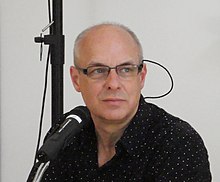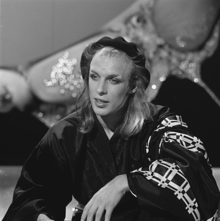Brian eno
Brian Peter George St. John le Baptiste de la Salle Eno (Woodbridge, Suffolk, May 15, 1948), artistically Brian Eno or Eno, is an English composer, activist, singer and music producer. Throughout his career he has developed work in musical genres such as ambient -of which he is considered a pioneer-, glam-rock -with Roxy Music-, electronic and experimental music.
Considered a visionary and innovator in many fields of music, he has also developed work in other artistic disciplines, especially installation and visual arts. He was the composer of the Windows 95 logon sound file, dubbed "The Microsoft Sound", and has helped develop the Kōan algorithmic music generator.
In his career he has won awards at the BRIT (1994 and 1996), BAFTA (2012) and Grammy (1988, 2001, 2002, 2006, 2009 and 2010) awards. He has collaborated on joint projects with artists such as Robert Fripp, Cluster, Harold Budd, David Bowie or David Byrne and produced albums for artists such as John Cale, Talking Heads, Devo, Ultravox, U2, Laurie Anderson, Grace Jones, Slowdive, Coldplay, James Blake, Kevin Shields, Camel, Travis, James or Damon Albarn.
In 1996 Brian Eno, among others, founded the Long Now Foundation, in order to teach people to think about the future of society in the very long term. He is a columnist in the British newspaper The Observer .
Biography
Early Years
Brian Eno studied at a private school, St. Joseph's College, in Birkfield, before, at the age of sixteen, he enrolled in the Art School, a British institution equivalent to an Art School. Intermediate Fine Art—from Ipswich and Winchester, graduating in 1969.
Since his childhood, Eno saw very clearly that he wanted to dedicate himself to artistic activity. Already at school he experimented with music using a tape recorder, and his painting teacher Tom Phillips encouraged him to continue with it. Between them they organized a peculiar "performance" consisting of arranging a series of pianos in a room and hitting them with tennis balls.
"When I was very young—I was actually nine—I made the decision that I was never going to have a regular job. One particular incident accelerated my decision. My father came home after work one day and had been working more than usual. He was a mailman and we were in winter, so he had been crawling through the snow for 12 hours, since 4am. At home, he threw himself in a chair and was so tired he couldn't even eat. Hambre had, and he didn't stop taking food with the fork... but he was incapable of eating it, he fell asleep. Then I thought, that's never gonna happen to me. And I think I've done it so far."Brian Eno
Once he graduated, he moved to London, where he collaborated with Cornelius Cardew's Scratch Orchestra, in whose recording of The Great Learning (Deutsche Grammophon, 1971) he intervened as one of the voices; and with Malcom Le Grice on the soundtrack of Berlin Horse (1971), a nine-minute experimental film.
Her numerous collaborations include work with electronic music producer Jon Hopkins, with whom she has produced albums such as Viva la Vida or Death and All His Friends by the band Coldplay. Brian Eno recently collaborated with the band for the album Ghost Stories and they once again had the collaboration of Hopkins.
Roxy Music
Eno began his professional musical career in 1971 when he joined the glam rock and art rock group Roxy Music. Bryan Ferry, leader of the band, recruited Eno on the recommendation of saxophonist Andy Mackay who, after acquiring a VCS3 synthesizer, had found himself unable to handle it. Eno did succeed, and was initially incorporated as the operator of the mixing desk and the pre-recorded tapes, in addition to the synthesizer and the choirs, but without acting on stage. He would eventually appear with the rest of the musicians, with an appearance and outfit even more outlandish and androgynous than his classmates.
"I always felt like a pop star. It's fun. Even when I was at the art school, I used to dress like what I thought made me feel special. My outfit was very extravagant and I used to make my clothes myself. He had the attitude, if not of a pop star, of someone who could do whatever he wanted. "Brian Eno (2012) [1]
With Roxy Music he recorded the singles "Virginia Plain/The Numberer" (1972) and "Pyjamarama" (1973), and the albums Roxy Music (1972) and For Your Pleasure (1973). After serious disagreements with Bryan Ferry after the tour to promote this second album, Eno left the project and began his solo career.
Solo career
After leaving Roxy Music, Eno released his first solo albums: Here Come The Warm Jets (1973), followed by Taking Tiger Mountain (By Strategy) (1974) and Another Green World (1975). At this stage he settles into a sound reminiscent of his time at Roxy Music, close to pop with avant-garde touches, although he gradually includes more experimental nuances and far from the usual song format. Here Come The Warm Jets includes his first collaboration with Robert Fripp (of King Crimson) an artistic collaboration that has continued throughout the years, on the track "Baby's On Fire", one of his best-known songs from this first stage along with "Third Uncle", later covered by the Bauhaus group.
Before and After Science (1977) would be the most outstanding precedent, starting from art rock, for his most important contribution to the so-called ambient music and to all kinds of avant-garde experiments. The term "ambient music" itself was coined from his series of muzak-inspired albums, including Ambient 1: Music for Airports, The Plateaux of Mirror, Day of Radiance and On Land.
"I realized that what I wanted was to make music that didn't change much, that it was like a painting more than a play, something that kept static. So I started making a form of motionless music, more like a painting. At first call. still musicThen atmosphere. The most important thing about atmosphere It was that pictorial quality, the colors of sound, not history. A lot of music is a narrative progression. I wanted to run away from the narrative."Brian Eno (Diario El País, 2017) [2]
Among his collaborations, the one made with David Byrne, former member of Talking Heads, on My Life in the Bush of Ghosts (1981) stands out, one of the first records that was not rap or hip hop in making extensive use of samplings. With Robert Wyatt on the album Shleep (1997). With Jon Hassell or with the German duo Cluster. Along with his brother, Roger Eno, he has also collaborated. One of his most notable collaborations was with David Bowie, as lyricist and composer of his influential Berlin Trilogy (Low, Heroes and Lodger), and later on albums such as 1.Outside and on the track "I'm Afraid of Americans".
"Some people tacho the style of David Bowie as superficial or containing recycled ideas, but that sounds like a good definition of pop for me. It's popular art."Brian Eno (2008) [3]
Discography
Solo
- Here Come The Warm Jets (1974)
- Taking Tiger Mountain (By Strategy) (1974)
- Another Green World (1975)
- Discreet Music (1975)
- Before And After Science (1977)
- Ambient 1: Music For Airports (1978)
- Music For Films (1978)
- Ambient 4: On Land (1982)
- Apollo: Atmospheres And Soundtracks (1983)
- Music For Films Volume 2 (1983)
- Thursday Afternoon (1985)
- Nerve Net (1992)
- The Shutov Assembly (1992)
- Neroli (1993)
- Headcandy (1994)
- The Drop (1997)
- Another Day On Earth (2005)
- Lux (2012)
- The Ship (2016)
- Reflection (2017)
- Sisters (2017)
- Music For Installations (2018)
Albums for Artistic Installations
- Extracts from Music for White Cube, London 1997 (1997)
- Lightness: Music for the Marble Palace (1997)
- I Dormienti (1999)
- Kite Stories (1999)
- Music for Civic Recovery Centre (2000)
- Compact Forest Proposal (2001)
- January 07003: Bell Studies for the Clock of the Long Now (2003)
- Making Space (2010)
Compilations
- Film music 1976 - 2020 (2020)
Contenido relacionado
Toba Sōjō
Maurice Ravel
Mambo



